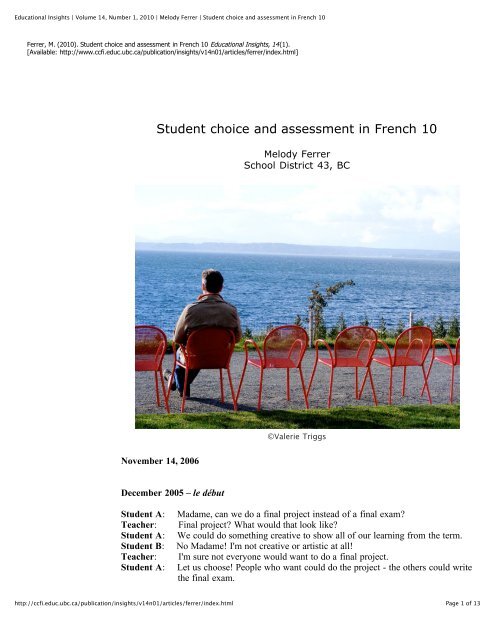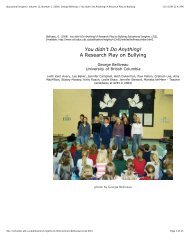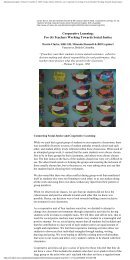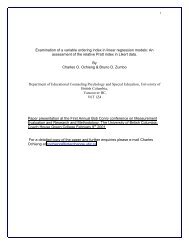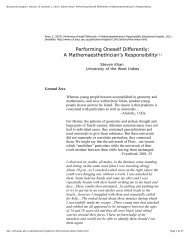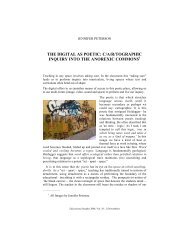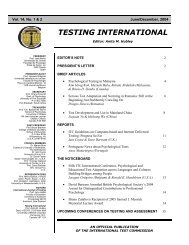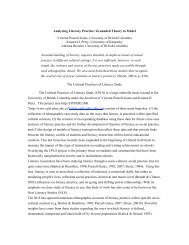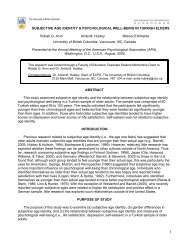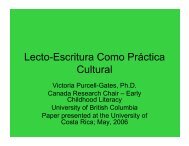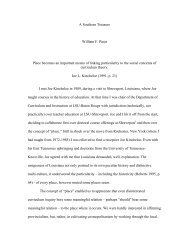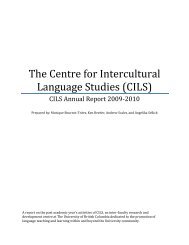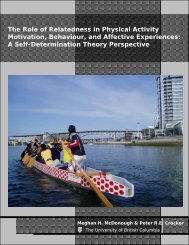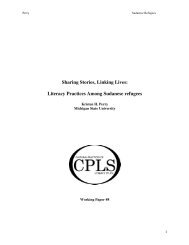Student choice and assessment in French 10
Student choice and assessment in French 10
Student choice and assessment in French 10
You also want an ePaper? Increase the reach of your titles
YUMPU automatically turns print PDFs into web optimized ePapers that Google loves.
Educational Insights | Volume 14, Number 1, 20<strong>10</strong> | Melody Ferrer | <strong>Student</strong> <strong>choice</strong> <strong>and</strong> <strong>assessment</strong> <strong>in</strong> <strong>French</strong> <strong>10</strong><br />
Ferrer, M. (20<strong>10</strong>). <strong>Student</strong> <strong>choice</strong> <strong>and</strong> <strong>assessment</strong> <strong>in</strong> <strong>French</strong> <strong>10</strong> Educational Insights, 14(1).<br />
[Available: http://www.ccfi.educ.ubc.ca/publication/<strong>in</strong>sights/v14n01/articles/ferrer/<strong>in</strong>dex.html]<br />
http://ccfi.educ.ubc.ca/publication/<strong>in</strong>sights/v14n01/articles/ferrer/<strong>in</strong>dex.html<br />
<strong>Student</strong> <strong>choice</strong> <strong>and</strong> <strong>assessment</strong> <strong>in</strong> <strong>French</strong> <strong>10</strong><br />
November 14, 2006<br />
December 2005 – le début<br />
Melody Ferrer<br />
School District 43, BC<br />
©Valerie Triggs<br />
<strong>Student</strong> A: Madame, can we do a f<strong>in</strong>al project <strong>in</strong>stead of a f<strong>in</strong>al exam?<br />
Teacher: F<strong>in</strong>al project? What would that look like?<br />
<strong>Student</strong> A: We could do someth<strong>in</strong>g creative to show all of our learn<strong>in</strong>g from the term.<br />
<strong>Student</strong> B: No Madame! I'm not creative or artistic at all!<br />
Teacher: I'm sure not everyone would want to do a f<strong>in</strong>al project.<br />
<strong>Student</strong> A: Let us choose! People who want could do the project - the others could write<br />
the f<strong>in</strong>al exam.<br />
Page 1 of 13
Educational Insights | Volume 14, Number 1, 20<strong>10</strong> | Melody Ferrer | <strong>Student</strong> <strong>choice</strong> <strong>and</strong> <strong>assessment</strong> <strong>in</strong> <strong>French</strong> <strong>10</strong><br />
Teacher: Hmmm, let me th<strong>in</strong>k about it . . .<br />
Thus began my foray <strong>in</strong>to student <strong>choice</strong> <strong>and</strong> <strong>assessment</strong> <strong>in</strong> <strong>French</strong> <strong>10</strong>. About half the class<br />
did portfolios <strong>and</strong> the other half wrote a traditional exam. I found that most students' test<br />
results were lower than their average mark <strong>in</strong> the class. Some students who had A's actually<br />
did quite poorly on the test. This could be due <strong>in</strong> part to the format of the test. Some<br />
students who were able to score well on unit tests throughout the term did not do well when<br />
faced with all the grammar <strong>and</strong> vocabulary <strong>in</strong>tegrated <strong>in</strong>to one test. Conversely, the<br />
portfolios were excellent representations of what the students had learned dur<strong>in</strong>g <strong>French</strong><br />
that term. They had applied their knowledge <strong>in</strong> <strong>in</strong>novative <strong>and</strong> creative ways that surpassed<br />
my expectations. One of the girls told me she learned "way more" do<strong>in</strong>g the portfolio than<br />
by study<strong>in</strong>g for a f<strong>in</strong>al exam. I was so pleased with the results that the follow<strong>in</strong>g semester I<br />
<strong>in</strong>sisted that all of my <strong>French</strong> <strong>10</strong> students complete a portfolio rather than a f<strong>in</strong>al exam.<br />
They did not have a <strong>choice</strong>.<br />
The literature, however, suggests that there is a positive correlation between <strong>choice</strong> <strong>and</strong><br />
motivation to learn (Gentry & Spr<strong>in</strong>ger, 2002; P<strong>in</strong>trich & DeGroot, 1990; Douglas, 2004).<br />
In fact, the Western <strong>and</strong> Northern Canadian Protocol for Collaboration <strong>in</strong> Education's<br />
comprehensive document entitled Reth<strong>in</strong>k<strong>in</strong>g Classroom Assessment with Purpose <strong>in</strong> M<strong>in</strong>d<br />
states: "When students feel ownership <strong>and</strong> have <strong>choice</strong> <strong>in</strong> their learn<strong>in</strong>g, they are more<br />
likely to <strong>in</strong>vest time <strong>and</strong> energy <strong>in</strong> it." (WNCP, 19, 2005) Therefore, I decided to research<br />
the effects of allow<strong>in</strong>g students <strong>in</strong> <strong>French</strong> <strong>10</strong> the <strong>choice</strong> of do<strong>in</strong>g either a f<strong>in</strong>al project or a<br />
traditional f<strong>in</strong>al exam.<br />
I believe that some of my students will be better able to show their true acquisition of<br />
<strong>French</strong> knowledge through the creation of a f<strong>in</strong>al project. Many students suffer from test<br />
anxiety <strong>and</strong> are unable to perform to their full potential dur<strong>in</strong>g exams. Other students may<br />
prefer the idea of a f<strong>in</strong>al exam because they may see it as "less work" <strong>and</strong> are confident that<br />
they will do well. McTighe & O'Connor (2005) state: "To make valid <strong>in</strong>ferences about<br />
learn<strong>in</strong>g, teachers need to allow students to work to their strengths. A st<strong>and</strong>ardized<br />
approach to classroom <strong>assessment</strong> may be efficient, but it is not fair because any chosen<br />
format will favour some students <strong>and</strong> penalizes others" (14).<br />
Recent research on <strong>assessment</strong> <strong>in</strong>dicates that tra<strong>in</strong><strong>in</strong>g students to do well on st<strong>and</strong>ardized<br />
tests will not result <strong>in</strong> an <strong>in</strong>crease <strong>in</strong> mean<strong>in</strong>gful learn<strong>in</strong>g (Herman, 1992). Furthermore,<br />
teach<strong>in</strong>g for social justice means try<strong>in</strong>g to f<strong>in</strong>d more authentic <strong>assessment</strong>s that will<br />
demonstrate what students have actually learned rather than tra<strong>in</strong><strong>in</strong>g them <strong>in</strong> test-tak<strong>in</strong>g.<br />
Kelly & Br<strong>and</strong>es (2005) argue that <strong>assessment</strong> can be seen as "a set of <strong>in</strong>stitutional<br />
processes with the potential either to <strong>in</strong>hibit or nurture the development of young people as<br />
well as either to constra<strong>in</strong> or nurture their capacity for self-determ<strong>in</strong>ation" (2).<br />
I believe that this research project will not only enhance student learn<strong>in</strong>g, but will also<br />
create a more socially just classroom environment. <strong>Student</strong>s will hopefully feel empowered<br />
through the process because they will have a <strong>choice</strong> as to how they will be assessed. For<br />
those who choose the f<strong>in</strong>al project, they will be able to make many <strong>choice</strong>s as to how to<br />
best portray what they have learned <strong>in</strong> <strong>French</strong> <strong>10</strong>. The research project will provide an<br />
opportunity for <strong>in</strong>creased reflection about learn<strong>in</strong>g on the part of the students <strong>and</strong> teacher.<br />
<strong>Student</strong>s will be given a voice at a time when they are fac<strong>in</strong>g the pressures of external<br />
st<strong>and</strong>ardized <strong>assessment</strong>s <strong>in</strong> other courses (Math <strong>10</strong>, Science <strong>10</strong>, English <strong>10</strong>).<br />
Research Questions<br />
http://ccfi.educ.ubc.ca/publication/<strong>in</strong>sights/v14n01/articles/ferrer/<strong>in</strong>dex.html<br />
Page 2 of 13
Educational Insights | Volume 14, Number 1, 20<strong>10</strong> | Melody Ferrer | <strong>Student</strong> <strong>choice</strong> <strong>and</strong> <strong>assessment</strong> <strong>in</strong> <strong>French</strong> <strong>10</strong><br />
http://ccfi.educ.ubc.ca/publication/<strong>in</strong>sights/v14n01/articles/ferrer/<strong>in</strong>dex.html<br />
1. What will be the effects of offer<strong>in</strong>g <strong>French</strong> <strong>10</strong> students a <strong>choice</strong> on their f<strong>in</strong>al<br />
<strong>assessment</strong>?<br />
2. How will students who typically do poorly on traditional tests perform on a selfdirected<br />
f<strong>in</strong>al project?<br />
3. In what ways will grades <strong>in</strong>fluence students' <strong>choice</strong>s?<br />
4. How will learn<strong>in</strong>g experiences vary for students who engage <strong>in</strong> f<strong>in</strong>al projects vs.<br />
f<strong>in</strong>al exams?<br />
Methodology<br />
All students <strong>in</strong> my two <strong>French</strong> <strong>10</strong> classes participated <strong>in</strong> all activities s<strong>in</strong>ce they were<br />
designed <strong>in</strong> such a way as to help students learn the curriculum no matter which method of<br />
<strong>assessment</strong> they choose. All activities occurred dur<strong>in</strong>g class time or were part of the usual<br />
amount of assigned homework. I sent a letter of consent home with students <strong>and</strong> asked<br />
them to return the parental <strong>and</strong> student consent forms to me <strong>in</strong> a sealed envelope. The<br />
sealed envelopes were stored <strong>in</strong> a locked fil<strong>in</strong>g cab<strong>in</strong>et until f<strong>in</strong>al marks were submitted.<br />
Data for the research were collected from all of the students; however, only the data from<br />
students with signed consent forms was analyzed to provide <strong>in</strong>sights <strong>in</strong>to teach<strong>in</strong>g <strong>and</strong><br />
learn<strong>in</strong>g. Of those who gave consent, I selected a r<strong>and</strong>om sample of 15 students for <strong>in</strong>depth<br />
analysis. Pseudonyms have been used throughout this document to protect student<br />
privacy.<br />
I distributed duo tangs to each student <strong>and</strong> expla<strong>in</strong>ed that they would be writ<strong>in</strong>g their<br />
reflections on the f<strong>in</strong>al exam / f<strong>in</strong>al project preparation process <strong>in</strong> a learn<strong>in</strong>g log. <strong>Student</strong>s<br />
were asked to make a chart of the pros <strong>and</strong> cons of writ<strong>in</strong>g a f<strong>in</strong>al exam <strong>and</strong> creat<strong>in</strong>g a<br />
f<strong>in</strong>al project. They were then told that they were allowed to choose either the f<strong>in</strong>al exam or<br />
the f<strong>in</strong>al project. <strong>Student</strong>s were shown examples of f<strong>in</strong>al projects that were created by the<br />
previous year's <strong>French</strong> <strong>10</strong> classes <strong>and</strong> then wrote a journal entry about how they felt about<br />
the project option. Midway through the f<strong>in</strong>al exam / f<strong>in</strong>al project preparation process,<br />
students were asked to write an entry about how they were progress<strong>in</strong>g.<br />
All students were provided with an outl<strong>in</strong>e of concepts that had been covered throughout<br />
the term. <strong>Student</strong>s could use it as a guide for f<strong>in</strong>al exam review or for what needed to be<br />
<strong>in</strong>corporated <strong>in</strong>to the f<strong>in</strong>al project. For students who chose the f<strong>in</strong>al exam, the last page of<br />
the exam had questions <strong>and</strong> space so they could <strong>in</strong>dicate how accurately they felt the test<br />
assessed their knowledge. Did they th<strong>in</strong>k it was a fair <strong>assessment</strong>? Did they wish they had<br />
chosen to do a f<strong>in</strong>al project? Why or why not? The day after students wrote the f<strong>in</strong>al exam<br />
or h<strong>and</strong>ed <strong>in</strong> the f<strong>in</strong>al project, they made a f<strong>in</strong>al entry <strong>in</strong> their learn<strong>in</strong>g log. Now that they<br />
had f<strong>in</strong>ished, how did they feel about their work? Were they satisfied? Did they feel the<br />
f<strong>in</strong>al exam / project reflected their best work? Did they wish they had chosen the other<br />
method of <strong>assessment</strong>? What did they learn dur<strong>in</strong>g this process?<br />
After each class, I made notes on what I observed <strong>in</strong> my classroom. <strong>Student</strong>s asked me<br />
questions about the f<strong>in</strong>al exam / f<strong>in</strong>al project that <strong>in</strong>formed my <strong>in</strong>quiry <strong>and</strong> shaped my<br />
research. I noted students' reactions after <strong>in</strong>troduc<strong>in</strong>g the <strong>choice</strong> of the f<strong>in</strong>al project. While<br />
students were engaged <strong>in</strong> various activities, I made note of their comments <strong>and</strong> reactions. I<br />
also reflected on my teach<strong>in</strong>g practice <strong>in</strong> depth.<br />
Page 3 of 13
Educational Insights | Volume 14, Number 1, 20<strong>10</strong> | Melody Ferrer | <strong>Student</strong> <strong>choice</strong> <strong>and</strong> <strong>assessment</strong> <strong>in</strong> <strong>French</strong> <strong>10</strong><br />
Key F<strong>in</strong>d<strong>in</strong>gs<br />
http://ccfi.educ.ubc.ca/publication/<strong>in</strong>sights/v14n01/articles/ferrer/<strong>in</strong>dex.html<br />
©Michele Sorensen<br />
<strong>Student</strong>s made the comments appear<strong>in</strong>g <strong>in</strong> Table 1.1 on the day I <strong>in</strong>troduced the concept of<br />
<strong>choice</strong> for their f<strong>in</strong>al <strong>assessment</strong>. At this po<strong>in</strong>t, they had not yet seen any examples of<br />
projects from the previous year's classes. The <strong>in</strong>itial response was lukewarm as many<br />
students were <strong>in</strong>terpret<strong>in</strong>g the project as "too much work".<br />
Table 1.1 <strong>Student</strong>s' <strong>in</strong>itial thoughts about the f<strong>in</strong>al project vs. the f<strong>in</strong>al exam FINAL<br />
The follow<strong>in</strong>g day, however, I presented a variety of examples of f<strong>in</strong>al projects to my<br />
students. Some were hard copies while others were PowerPo<strong>in</strong>t presentations. I was very<br />
pleased to see so much enthusiasm <strong>and</strong> <strong>in</strong>terest <strong>in</strong> the projects after I had shown the<br />
examples. One student commented, "I th<strong>in</strong>k it will help me learn more." The room was<br />
buzz<strong>in</strong>g with excitement <strong>and</strong> I was thrilled! I felt validated that offer<strong>in</strong>g the students <strong>choice</strong><br />
Page 4 of 13
Educational Insights | Volume 14, Number 1, 20<strong>10</strong> | Melody Ferrer | <strong>Student</strong> <strong>choice</strong> <strong>and</strong> <strong>assessment</strong> <strong>in</strong> <strong>French</strong> <strong>10</strong><br />
was mak<strong>in</strong>g them more motivated to learn.<br />
The follow<strong>in</strong>g are excerpts from students' learn<strong>in</strong>g journals, which <strong>in</strong>dicate their <strong>in</strong>itial<br />
thoughts <strong>and</strong> enthusiasm regard<strong>in</strong>g the project <strong>and</strong> how they saw it as a potentially valuable<br />
learn<strong>in</strong>g experience:<br />
Gunther<br />
I am go<strong>in</strong>g to do the f<strong>in</strong>al project <strong>in</strong>stead of the f<strong>in</strong>al exam now that I have seen examples. I<br />
have a great idea for my f<strong>in</strong>al project that will <strong>in</strong>corporate everyth<strong>in</strong>g I learned this year. I<br />
will make a PowerPo<strong>in</strong>t project from the view of Paris officials try<strong>in</strong>g to get the summer<br />
Olympics. An example of how I will <strong>in</strong>corporate the <strong>French</strong> I learned this year would be<br />
how I use the negative <strong>in</strong> sentences like "No one can host the Olympics better than Paris" –<br />
<strong>in</strong> <strong>French</strong> of course. I am very happy now that I have a solid idea for my project.<br />
Jac<strong>in</strong>the<br />
Now that I have seen the criteria I've decided to make a project. I th<strong>in</strong>k it's go<strong>in</strong>g to be a<br />
great way to show what I learned this term <strong>in</strong> <strong>French</strong>. I can also portray a more creative<br />
side of me. This project can help me to improve <strong>and</strong> practice all the verb tenses <strong>and</strong><br />
vocabulary we learned this year. I th<strong>in</strong>k do<strong>in</strong>g a f<strong>in</strong>al project is a good idea <strong>and</strong> a great<br />
way to end the term.<br />
C<strong>and</strong>ide<br />
At this po<strong>in</strong>t I'm lean<strong>in</strong>g towards do<strong>in</strong>g a project rather than do<strong>in</strong>g an exam because I am<br />
bad at do<strong>in</strong>g tests under pressure. I th<strong>in</strong>k I actually learn more from do<strong>in</strong>g projects <strong>and</strong> I<br />
am more successful do<strong>in</strong>g projects of that sort rather than cramm<strong>in</strong>g for an exam <strong>and</strong><br />
freez<strong>in</strong>g up when I have to take it. I do th<strong>in</strong>k that mak<strong>in</strong>g a project will take more time <strong>and</strong><br />
a lot of effort but I th<strong>in</strong>k it is worth the work. By not do<strong>in</strong>g an exam it will give you an<br />
opportunity to spend more time focus<strong>in</strong>g on the other exams you have, with do<strong>in</strong>g a project<br />
you can do it ahead of time <strong>and</strong> be stress free come exams!<br />
Based on students' comments, I felt that the large majority was go<strong>in</strong>g to choose a project<br />
over a f<strong>in</strong>al exam. However, after see<strong>in</strong>g the quality <strong>and</strong> work of the exemplar projects,<br />
some students decided immediately that they would prefer to do a f<strong>in</strong>al exam:<br />
George<br />
After see<strong>in</strong>g the sample projects, I've decided that I would rather do an exam. Not that I<br />
don't like do<strong>in</strong>g projects, I do. But I have so many projects from my other teachers before<br />
the f<strong>in</strong>al that I fear I won't have time to f<strong>in</strong>ish it. Last night, I went to bed at 1:00 a.m. <strong>and</strong><br />
woke up at 7:00 a.m. I'm so tired.<br />
Other students struggled with choos<strong>in</strong>g an <strong>assessment</strong> option. They were also concerned<br />
about lack of time <strong>and</strong> the amount of work to do a good job:<br />
Amelia<br />
I am becom<strong>in</strong>g anxious because I still have not come to a f<strong>in</strong>al decision about which<br />
project/exam I will choose. The project would be a wonderful learn<strong>in</strong>g experience but I am<br />
deeply afraid I will not be able to put <strong>in</strong> my full effort because of a lack of time. I am <strong>in</strong><br />
quite a pickle because <strong>in</strong> the end I th<strong>in</strong>k the project will be the best way to learn <strong>in</strong>stead of<br />
just memoriz<strong>in</strong>g.<br />
Penelope<br />
After see<strong>in</strong>g the projects, I'm still not exactly sure which one to do. I th<strong>in</strong>k I'd do well on my<br />
http://ccfi.educ.ubc.ca/publication/<strong>in</strong>sights/v14n01/articles/ferrer/<strong>in</strong>dex.html<br />
Page 5 of 13
Educational Insights | Volume 14, Number 1, 20<strong>10</strong> | Melody Ferrer | <strong>Student</strong> <strong>choice</strong> <strong>and</strong> <strong>assessment</strong> <strong>in</strong> <strong>French</strong> <strong>10</strong><br />
exam but I'm not sure if I really want to study. The project looks more fun but after see<strong>in</strong>g<br />
the really good examples, it looks like a lot of work.<br />
I recognized that I must not push students to choose a f<strong>in</strong>al project just because I th<strong>in</strong>k it is<br />
better. The Western <strong>and</strong> Northern Canadian Protocol for Collaboration <strong>in</strong> Education echo<br />
McTighe <strong>and</strong> O'Connor (2005) with respect to allow<strong>in</strong>g students to work to their strengths:<br />
"If teachers are to have a good underst<strong>and</strong><strong>in</strong>g of an <strong>in</strong>dividual student's learn<strong>in</strong>g, they need<br />
to allow that student to demonstrate his or her competence <strong>in</strong> a manner that suits his or her<br />
<strong>in</strong>dividual strengths." (WNCP, 21, 2006)<br />
Therefore, I must keep <strong>in</strong> m<strong>in</strong>d that not all students will excel at a f<strong>in</strong>al project. Not all<br />
students are creative. Many excel at traditional tests <strong>and</strong> are comfortable with that format. I<br />
also recognized that many students want to please the teacher <strong>and</strong> will look to me for cues<br />
as to which option they should choose. This was particularly true <strong>in</strong> the case of Karl, who<br />
wrote, "Today, Mme Ferrer expla<strong>in</strong>ed more about how the f<strong>in</strong>al project is supposed to look<br />
like with content <strong>and</strong> creativity. I still can't decide what to pick. I'm hop<strong>in</strong>g that Madame<br />
could give me some of her op<strong>in</strong>ions based on it." Karl had the highest mark <strong>in</strong> the class <strong>and</strong><br />
was a perfectionist. Every previous project he had completed went beyond the criteria <strong>and</strong><br />
exceeded my expectations. I really wanted to see what k<strong>in</strong>d of a project he would do<br />
because I knew it would be excellent! However, Karl came to see me the next day after<br />
school <strong>and</strong> asked, "What should I do?" I replied that he should choose whichever option<br />
suited him best. I realized that Karl would have done the project if I had said that it was<br />
"the best <strong>choice</strong>." However, as a student who typically got 98% or higher on tests, why<br />
should he do a project when a f<strong>in</strong>al exam would be easier <strong>and</strong> less time-consum<strong>in</strong>g for<br />
him? At this po<strong>in</strong>t, I started to ask myself whether students were more motivated to learn or<br />
to earn the highest possible grade. In the end, Karl chose the f<strong>in</strong>al exam <strong>and</strong> got 98%.<br />
Although 36 out of 51 students <strong>in</strong>itially planned to do a f<strong>in</strong>al project, only 12 actually<br />
completed one while the rest opted for the f<strong>in</strong>al exam. Of those 12 projects, five were<br />
excellent, five were very good <strong>and</strong> two did not meet expectations. Among the 24 students<br />
who changed their m<strong>in</strong>ds about creat<strong>in</strong>g a f<strong>in</strong>al project, 20 performed poorly on the f<strong>in</strong>al<br />
exam. By poorly I mean that each of those students obta<strong>in</strong>ed a mark of either one or more<br />
letter grades below their previous average. The majority of students who opted for the f<strong>in</strong>al<br />
project were satisfied with their <strong>choice</strong> <strong>and</strong> the overall learn<strong>in</strong>g experience. The high<br />
achievers who opted for the f<strong>in</strong>al exam were also happy with their <strong>choice</strong>. The group that<br />
was the most disappo<strong>in</strong>ted consisted of those students who had <strong>in</strong>itially opted for the<br />
project but then changed their m<strong>in</strong>ds <strong>and</strong> opted for the f<strong>in</strong>al exam. Table 1.2 details their<br />
comments.<br />
http://ccfi.educ.ubc.ca/publication/<strong>in</strong>sights/v14n01/articles/ferrer/<strong>in</strong>dex.html<br />
Table 1.2 <strong>Student</strong>s' thoughts after the f<strong>in</strong>al project / f<strong>in</strong>al exam<br />
Page 6 of 13
Educational Insights | Volume 14, Number 1, 20<strong>10</strong> | Melody Ferrer | <strong>Student</strong> <strong>choice</strong> <strong>and</strong> <strong>assessment</strong> <strong>in</strong> <strong>French</strong> <strong>10</strong><br />
Data analysis<br />
From the data, I have found some prelim<strong>in</strong>ary answers to my research questions.<br />
How will students who typically do poorly on traditional tests perform on a self-directed<br />
f<strong>in</strong>al project?<br />
I expected to be able to say, "much better" <strong>in</strong> response to this question. I had seen such<br />
success with the previous year's students that I never imag<strong>in</strong>ed that students would do<br />
poorly on a self-directed f<strong>in</strong>al project. However, I had two students do projects that were<br />
completely unrelated to the criteria. They both obviously plagiarized, s<strong>in</strong>ce the <strong>French</strong> was<br />
perfect <strong>and</strong> at a university level. I do not know what they were th<strong>in</strong>k<strong>in</strong>g, <strong>and</strong> unfortunately<br />
I never had a chance to ask them, s<strong>in</strong>ce they h<strong>and</strong>ed <strong>in</strong> their projects on the last day of<br />
classes <strong>and</strong> I have not seen them s<strong>in</strong>ce. These students typically failed every test <strong>and</strong> would<br />
surely have failed the f<strong>in</strong>al exam. However, <strong>in</strong>stead of ris<strong>in</strong>g to the occasion <strong>and</strong> creat<strong>in</strong>g<br />
someth<strong>in</strong>g unique, they simply cut <strong>and</strong> pasted text from various <strong>French</strong> sites <strong>and</strong> called it a<br />
f<strong>in</strong>al project. I was very disappo<strong>in</strong>ted.<br />
On the other h<strong>and</strong>, I did have four major success stories. These students were all very close<br />
to an A, despite tend<strong>in</strong>g to do poorly on tests. They excelled on the f<strong>in</strong>al project, <strong>and</strong><br />
consequently achieved an A for a f<strong>in</strong>al grade.<br />
In what ways will grades <strong>in</strong>fluence students' <strong>choice</strong>s?<br />
<strong>Student</strong>s who were high achievers <strong>and</strong> were successful at writ<strong>in</strong>g tests, chose to write the<br />
f<strong>in</strong>al exam. <strong>Student</strong>s who typically scored poorly on traditional tests <strong>in</strong>itially opted for the<br />
project.<br />
How will learn<strong>in</strong>g experiences vary for students who engage <strong>in</strong> f<strong>in</strong>al projects vs. f<strong>in</strong>al<br />
exams?<br />
This question is a bit more difficult to answer. The two students who plagiarized<br />
extensively <strong>in</strong> their f<strong>in</strong>al projects did not engage <strong>in</strong> a mean<strong>in</strong>gful learn<strong>in</strong>g experience. Two<br />
http://ccfi.educ.ubc.ca/publication/<strong>in</strong>sights/v14n01/articles/ferrer/<strong>in</strong>dex.html<br />
Page 7 of 13
Educational Insights | Volume 14, Number 1, 20<strong>10</strong> | Melody Ferrer | <strong>Student</strong> <strong>choice</strong> <strong>and</strong> <strong>assessment</strong> <strong>in</strong> <strong>French</strong> <strong>10</strong><br />
other students' projects were quite creative, but there were many grammatical errors. This<br />
was a concern because it showed the students <strong>in</strong> question had not ga<strong>in</strong>ed a deeper<br />
underst<strong>and</strong><strong>in</strong>g of the curriculum—they were still mak<strong>in</strong>g the same k<strong>in</strong>ds of errors they<br />
made on tests. I wondered how this was possible when they had access to their notes <strong>and</strong><br />
textbooks <strong>and</strong> were permitted to ask me questions. These students focused too much on the<br />
creative aspect of the project <strong>and</strong> not enough on the content. Perhaps this could have been<br />
prevented if we had created an <strong>assessment</strong> rubric together. However, the other eight<br />
projects were fantastic. The students were very creative <strong>and</strong> demonstrated a deeper<br />
underst<strong>and</strong><strong>in</strong>g of the curriculum. I believe that these students will remember the <strong>French</strong><br />
they used longer than the students who studied for the test, although at this po<strong>in</strong>t, I cannot<br />
measure that outcome.<br />
Unexpected outcomes – les surprises<br />
I did not anticipate that so many students would change their m<strong>in</strong>ds <strong>and</strong> opt for the f<strong>in</strong>al<br />
exam. The students who could have benefited the most ended up procrast<strong>in</strong>at<strong>in</strong>g <strong>and</strong><br />
choos<strong>in</strong>g the f<strong>in</strong>al exam. <strong>Student</strong> journals <strong>in</strong>dicated that time constra<strong>in</strong>ts, procrast<strong>in</strong>ation,<br />
feel<strong>in</strong>g overwhelmed, as well as a dem<strong>and</strong> for end of term projects for other classes were<br />
all factors that <strong>in</strong>fluenced students' decisions to switch to the f<strong>in</strong>al exam:<br />
Penelope<br />
I've decided to do a f<strong>in</strong>al exam. I haven't really studied yet but right now we're learn<strong>in</strong>g<br />
pronouns with lui & leur so that will be fresh on my m<strong>in</strong>d. I'll start my français study<strong>in</strong>g<br />
this weekend.<br />
Lola<br />
I would have liked to do the f<strong>in</strong>al project but I just don't have time now because my Socials<br />
<strong>and</strong> Plann<strong>in</strong>g teachers just assigned big projects, which are due <strong>in</strong> <strong>10</strong> days. I don't have<br />
time to do a <strong>French</strong> project too. I do well on tests so I'll just study for the exam.<br />
C<strong>and</strong>ide<br />
Last night I tried to start the project but I totally m<strong>in</strong>d blanked <strong>and</strong> gave up because I had<br />
no idea what to do. I tried. I'm sorry Madame, but I have decided to take the exam.<br />
I was surprised that C<strong>and</strong>ide was "sorry," <strong>and</strong> asked her why she said that. She replied that<br />
do<strong>in</strong>g the project would have been better <strong>and</strong> she felt that she was lett<strong>in</strong>g me down.<br />
Clearly, my attempt at appear<strong>in</strong>g neutral concern<strong>in</strong>g the <strong>choice</strong> of the f<strong>in</strong>al project was not<br />
entirely effective. I didn't count on the students' expertise at read<strong>in</strong>g between the l<strong>in</strong>es <strong>and</strong><br />
pick<strong>in</strong>g up on body language. In the future, I would engage <strong>in</strong> a frank discussion with the<br />
class regard<strong>in</strong>g the advantages <strong>and</strong> challenges associated with each <strong>choice</strong>. I would not<br />
attempt to appear neutral, particularly as one of the aspects of our school vision is to<br />
encourage educational risk-tak<strong>in</strong>g. I would encourage those who were comfortable writ<strong>in</strong>g<br />
traditional tests to try the project option, expla<strong>in</strong><strong>in</strong>g my educational beliefs that the project<br />
would be a more beneficial learn<strong>in</strong>g experience.<br />
It seems that the students who could have most benefited from engag<strong>in</strong>g <strong>in</strong> a f<strong>in</strong>al project<br />
were unable to do so due to poor work habits <strong>and</strong> poor organizational skills. These same<br />
students also had difficulty complet<strong>in</strong>g other class projects throughout the term. As I had<br />
such great results with the previous year, I wondered what the difference was this year.<br />
Two major factors came immediately to m<strong>in</strong>d. The first is time. Due to a teacher strike <strong>in</strong><br />
the fall, the first semester was shortened by one week. This created a crunch <strong>in</strong> all classes<br />
with many teachers scrambl<strong>in</strong>g to 'get through' the curriculum. <strong>Student</strong>s compla<strong>in</strong>ed of<br />
http://ccfi.educ.ubc.ca/publication/<strong>in</strong>sights/v14n01/articles/ferrer/<strong>in</strong>dex.html<br />
Page 8 of 13
Educational Insights | Volume 14, Number 1, 20<strong>10</strong> | Melody Ferrer | <strong>Student</strong> <strong>choice</strong> <strong>and</strong> <strong>assessment</strong> <strong>in</strong> <strong>French</strong> <strong>10</strong><br />
gett<strong>in</strong>g many assignments piled on them at the end of the term. I found that I was not able<br />
to devote as much class time to work on the projects as I had done the previous year. If I<br />
had not lost that week of time, the students would have been able to work on their projects<br />
<strong>in</strong> class. As it was, I was only able to give two full days of class time to either review for<br />
the exam or work on the project.<br />
The second factor is <strong>choice</strong>. The previous year, I did not allow students the <strong>choice</strong> of do<strong>in</strong>g<br />
a f<strong>in</strong>al exam or a f<strong>in</strong>al project <strong>in</strong> the second semester. I was conv<strong>in</strong>ced that do<strong>in</strong>g a f<strong>in</strong>al<br />
project would be a more mean<strong>in</strong>gful learn<strong>in</strong>g experience so I <strong>in</strong>sisted that everyone do one.<br />
Consequently, everyone put his or her best effort forth. This time around, students had the<br />
'fall back option' of choos<strong>in</strong>g the f<strong>in</strong>al exam if they weren't able to get go<strong>in</strong>g on their<br />
project. I feel that this contributed to so many students be<strong>in</strong>g ill prepared for the f<strong>in</strong>al exam,<br />
because <strong>in</strong>itially, they planned on do<strong>in</strong>g the project <strong>and</strong> did not start review<strong>in</strong>g or study<strong>in</strong>g<br />
for the f<strong>in</strong>al exam until the last m<strong>in</strong>ute.<br />
Implications<br />
The solution to this problem is not to remove <strong>choice</strong>, but rather to create some support<br />
structures that will enable students to be successful <strong>in</strong> achiev<strong>in</strong>g their goals. Clearly, more<br />
class time is needed to give students a chance to work on their ideas <strong>and</strong> consult with the<br />
teacher. Some students may also benefit from the project be<strong>in</strong>g broken down <strong>in</strong>to more<br />
manageable chunks, thus alleviat<strong>in</strong>g the feel<strong>in</strong>g of be<strong>in</strong>g overwhelmed <strong>and</strong> not know<strong>in</strong>g<br />
where to start. A timel<strong>in</strong>e could be created so that students would have specific dates set to<br />
accomplish certa<strong>in</strong> portions of their project. This could elim<strong>in</strong>ate the last m<strong>in</strong>ute panic <strong>and</strong><br />
subsequent switch to the f<strong>in</strong>al exam option, which left so many of my low to middle<br />
achievers ill prepared for the f<strong>in</strong>al.<br />
Why did so many of my high achievers opt for the f<strong>in</strong>al exam? It is true that, for many of<br />
them, study<strong>in</strong>g for a f<strong>in</strong>al was easier than creat<strong>in</strong>g someth<strong>in</strong>g new. However, a major<br />
<strong>in</strong>fluence was the fact that these students had to study for prov<strong>in</strong>cial exams <strong>in</strong> Math <strong>10</strong>,<br />
Science <strong>10</strong>, <strong>and</strong>/or English <strong>10</strong>. Some students actually had to study for three prov<strong>in</strong>cial<br />
exams. They saw work<strong>in</strong>g on a <strong>French</strong> project as tak<strong>in</strong>g away from valuable study time for<br />
these prov<strong>in</strong>cial exams. Penelope mentioned that if she had done the f<strong>in</strong>al project, she<br />
would "suck at Math." I consider myself fortunate to be able to offer my students <strong>choice</strong> <strong>in</strong><br />
<strong>assessment</strong> because there is no prov<strong>in</strong>cial exam <strong>in</strong> <strong>French</strong> until grade 12. However, the<br />
recent imposition of prov<strong>in</strong>cial exams at the grade <strong>10</strong> level has <strong>in</strong>fluenced students'<br />
perceptions as to what k<strong>in</strong>d of learn<strong>in</strong>g is important. I often have students work<strong>in</strong>g on<br />
Math, Science or English homework dur<strong>in</strong>g my <strong>French</strong> <strong>10</strong> classes. Hall et al. (2004) note <strong>in</strong><br />
their research the impact of SATs <strong>in</strong> Brita<strong>in</strong>: "the curricular areas that are setted say what is<br />
deemed of value" (812).<br />
Math, Science <strong>and</strong> English are seen to be "more important" than the other curricular areas<br />
at the grade <strong>10</strong> level because they have external exams. Is it any wonder then, that when<br />
provided <strong>choice</strong>, high achievers will decide how to best partition their time to get the best<br />
results? <strong>Student</strong>s like Penelope, Lola, <strong>and</strong> Jac<strong>in</strong>the knew that they could achieve an A on<br />
the f<strong>in</strong>al exam with less effort than it would take to create a f<strong>in</strong>al project. Thus, it made<br />
sense for them to change their m<strong>in</strong>ds about do<strong>in</strong>g a f<strong>in</strong>al project <strong>and</strong> opt for the f<strong>in</strong>al exam<br />
<strong>in</strong>stead. <strong>Student</strong>s like Karl <strong>and</strong> George decided early on to opt for the f<strong>in</strong>al exam. Here<br />
were their thoughts a week before the f<strong>in</strong>al exam.<br />
Karl<br />
The f<strong>in</strong>al exam is next week. I'm a bit nervous, because Prov<strong>in</strong>cials are also com<strong>in</strong>g.<br />
http://ccfi.educ.ubc.ca/publication/<strong>in</strong>sights/v14n01/articles/ferrer/<strong>in</strong>dex.html<br />
Page 9 of 13
Educational Insights | Volume 14, Number 1, 20<strong>10</strong> | Melody Ferrer | <strong>Student</strong> <strong>choice</strong> <strong>and</strong> <strong>assessment</strong> <strong>in</strong> <strong>French</strong> <strong>10</strong><br />
Teachers are pil<strong>in</strong>g me up with so many assignments <strong>and</strong> so much homework. They're<br />
rush<strong>in</strong>g s<strong>in</strong>ce the first semester is end<strong>in</strong>g. I also have a big project for Plann<strong>in</strong>g. I really<br />
want to do well on the exam. I will try my very best. I'm not go<strong>in</strong>g to do the project s<strong>in</strong>ce I<br />
know that my time is limited <strong>and</strong> I th<strong>in</strong>k memoriz<strong>in</strong>g is much easier for me.<br />
George<br />
I haven't really reviewed much <strong>French</strong> yet. I might start on the weekend. It's just so busy.<br />
The other teachers want us to study for their tests too <strong>and</strong> I have two prov<strong>in</strong>cial exams to<br />
worry about.<br />
http://ccfi.educ.ubc.ca/publication/<strong>in</strong>sights/v14n01/articles/ferrer/<strong>in</strong>dex.html<br />
©Lynn Csontos<br />
Conclusion – la f<strong>in</strong> (mais pas vraiment)<br />
After mark<strong>in</strong>g all the exams <strong>and</strong> projects, I was left feel<strong>in</strong>g somewhat disappo<strong>in</strong>ted. The<br />
students who I thought would have done the best job on the f<strong>in</strong>al project chose a f<strong>in</strong>al<br />
exam. Some students who had A's did so poorly on the f<strong>in</strong>al exam that their letter grade<br />
dropped to a B. I felt they would have def<strong>in</strong>itely gotten an A if they had chosen the f<strong>in</strong>al<br />
project. However, it was a matter of priorities <strong>and</strong> time management. Perhaps I should have<br />
let them s<strong>in</strong>k to a B, but they had been solid A students all term . . . was this one test truly<br />
<strong>in</strong>dicative of their <strong>French</strong> knowledge? Many students were suffer<strong>in</strong>g from colds <strong>and</strong> flu<br />
dur<strong>in</strong>g exam week so I took that <strong>in</strong>to account. S<strong>in</strong>ce the percentage was only one or two<br />
percent off from an A <strong>and</strong> they had ma<strong>in</strong>ta<strong>in</strong>ed an A all term, I felt justified <strong>in</strong> bump<strong>in</strong>g up<br />
their grades to 86%. However, it did make me questions the relevance of the f<strong>in</strong>al exam.<br />
One of the problems with my f<strong>in</strong>al exam / project is that it is a year-end, summative<br />
<strong>assessment</strong>. <strong>Student</strong>s do not get feedback on how to improve - they just get a f<strong>in</strong>al mark.<br />
Based on Gusky's (2003) research regard<strong>in</strong>g formative <strong>assessment</strong>, I am consider<strong>in</strong>g ways<br />
Page <strong>10</strong> of 13
Educational Insights | Volume 14, Number 1, 20<strong>10</strong> | Melody Ferrer | <strong>Student</strong> <strong>choice</strong> <strong>and</strong> <strong>assessment</strong> <strong>in</strong> <strong>French</strong> <strong>10</strong><br />
<strong>in</strong> which I can design a project similar to the f<strong>in</strong>al one, but <strong>in</strong>itiate it mid-way through the<br />
semester, giv<strong>in</strong>g students more time, guidance <strong>and</strong> feedback <strong>in</strong> order for it to be a<br />
mean<strong>in</strong>gful learn<strong>in</strong>g experience. If I do decide to give the f<strong>in</strong>al project / f<strong>in</strong>al exam option<br />
<strong>in</strong> the future, I will give the criteria outl<strong>in</strong>e at least one month <strong>in</strong> advance. Too many<br />
students had great project ideas but simply did not have the time to do a good job so they<br />
opted for the f<strong>in</strong>al exam – for which, clearly, many of them did not study sufficiently.<br />
In the meantime, I was left wonder<strong>in</strong>g how to reconcile the <strong>in</strong>itial enthusiasm displayed <strong>in</strong><br />
the first week of <strong>in</strong>troduc<strong>in</strong>g the option of the f<strong>in</strong>al project with the results. I found a partial<br />
answer <strong>in</strong> the article, Inside the Black Box: Rais<strong>in</strong>g St<strong>and</strong>ards through Classroom<br />
Assessment by Black & Wiliam (1998):<br />
http://ccfi.educ.ubc.ca/publication/<strong>in</strong>sights/v14n01/articles/ferrer/<strong>in</strong>dex.html<br />
When the classroom culture focuses on rewards, "gold stars," grades or class<br />
rank<strong>in</strong>g, then pupils look for ways to obta<strong>in</strong> the best marks rather than to<br />
improve their learn<strong>in</strong>g. One reported consequence is that, when they have<br />
any <strong>choice</strong>, pupils avoid difficult tasks. (7)<br />
This quote helps to expla<strong>in</strong> why all of my high achievers ultimately chose the f<strong>in</strong>al exam.<br />
They knew they could get the highest mark with the least amount of effort by writ<strong>in</strong>g a test,<br />
thus sav<strong>in</strong>g time <strong>and</strong> energy to devote to other subjects. My goal <strong>in</strong> offer<strong>in</strong>g <strong>choice</strong> was to<br />
provide students with more enrich<strong>in</strong>g learn<strong>in</strong>g experiences, not the path of least resistance.<br />
What could be done to avoid this <strong>in</strong> the future? Clearly, one classroom teacher work<strong>in</strong>g <strong>in</strong><br />
isolation can do little to change <strong>in</strong>stitutional practices <strong>and</strong> external pressures. However, a<br />
group of like-m<strong>in</strong>ded teachers can <strong>in</strong>deed effect positive change <strong>and</strong> fortunately, I work <strong>in</strong><br />
a school that has a keen group of educators collaborat<strong>in</strong>g on authentic <strong>and</strong> alternative<br />
<strong>assessment</strong> strategies. I am optimistic that we can make significant ga<strong>in</strong>s by creat<strong>in</strong>g a<br />
school culture that focuses on learn<strong>in</strong>g rather than on marks.<br />
I had hoped that offer<strong>in</strong>g students <strong>choice</strong> <strong>in</strong> how they will be assessed would create a more<br />
socially just classroom environment. However, I have learned that I need to do more than<br />
simply offer <strong>choice</strong>. I need to <strong>in</strong>volve students <strong>in</strong> the pedagogical process. I plan to<br />
implement the follow<strong>in</strong>g strategies put forth by Kelly & Br<strong>and</strong>es (2005) by:<br />
• Hav<strong>in</strong>g students participate <strong>in</strong> decid<strong>in</strong>g how to assess what <strong>and</strong> how they learn<br />
• Involv<strong>in</strong>g students <strong>in</strong> sett<strong>in</strong>g criteria for <strong>assessment</strong><br />
• Hav<strong>in</strong>g students help decide upon weight<strong>in</strong>g of various components of assignments<br />
• Encourag<strong>in</strong>g student self-<strong>assessment</strong> (17)<br />
Perhaps if I had done these th<strong>in</strong>gs then I would not have had two <strong>in</strong>stances of plagiarism<br />
<strong>and</strong> two projects that were high <strong>in</strong> creativity but low <strong>in</strong> content. Furthermore, if I'm to<br />
<strong>in</strong>volve students <strong>in</strong> the creation of an <strong>assessment</strong> rubric for the f<strong>in</strong>al project, then why not<br />
<strong>in</strong>volve them <strong>in</strong> the creation of the f<strong>in</strong>al exam as well? Gusky (2003) states:<br />
Many teachers still mistakenly believe that they must keep their <strong>assessment</strong>s<br />
secret. As a result, students come to regard <strong>assessment</strong>s as guess<strong>in</strong>g games . .<br />
. They view success as dependent on how well they can guess what their<br />
teachers will ask on quizzes, tests, <strong>and</strong> what other <strong>assessment</strong>s are (7).<br />
My current research design offers the most <strong>choice</strong> <strong>and</strong> opportunity for self-determ<strong>in</strong>ation to<br />
students who create f<strong>in</strong>al projects. In order to create a more socially just classroom<br />
environment, I need to allow students who choose the f<strong>in</strong>al exam option more <strong>in</strong>put <strong>in</strong>to its<br />
creation <strong>and</strong> design so that all voices may be heard.<br />
Page 11 of 13
Educational Insights | Volume 14, Number 1, 20<strong>10</strong> | Melody Ferrer | <strong>Student</strong> <strong>choice</strong> <strong>and</strong> <strong>assessment</strong> <strong>in</strong> <strong>French</strong> <strong>10</strong><br />
Post-script<br />
Conduct<strong>in</strong>g research <strong>in</strong> my own classroom has made me a much more reflective<br />
practitioner <strong>and</strong> has permeated all aspects of my teach<strong>in</strong>g. Assum<strong>in</strong>g two roles—teacher<br />
<strong>and</strong> researcher—sometimes felt like hav<strong>in</strong>g a split personality. I would teach, but parts of<br />
my thought processes were focused on observ<strong>in</strong>g <strong>and</strong> analyz<strong>in</strong>g students' behaviours <strong>in</strong><br />
light of my research questions. It was much more <strong>in</strong>tense than "just teach<strong>in</strong>g."<br />
Now, almost a year later, I f<strong>in</strong>d that I am still "obsessed" with the idea of <strong>choice</strong> <strong>and</strong><br />
<strong>assessment</strong>. I am teach<strong>in</strong>g <strong>French</strong> 12 for the first time <strong>and</strong> I feel terribly constra<strong>in</strong>ed by the<br />
prov<strong>in</strong>cial exam, which will count for 40% of the students' mark. Ironically, students can<br />
choose not to write the prov<strong>in</strong>cial exam—as long as they don't need it for university<br />
entrance. Meanwhile, I feel pressured to prepare all students for the exam because many<br />
have not yet made a <strong>choice</strong>. Unfortunately, this has resulted <strong>in</strong> my offer<strong>in</strong>g students fewer<br />
<strong>choice</strong>s as to how they will be assessed. I am unhappy with this <strong>and</strong> am look<strong>in</strong>g for ways to<br />
<strong>in</strong>tegrate more project-based learn<strong>in</strong>g, <strong>choice</strong> <strong>and</strong> flexibility <strong>in</strong>to the program.<br />
I am not teach<strong>in</strong>g <strong>French</strong> <strong>10</strong> at all this year, but I am teach<strong>in</strong>g <strong>French</strong> 11. Several students<br />
have already asked if I will offer the f<strong>in</strong>al project option aga<strong>in</strong>. I plan on implement<strong>in</strong>g the<br />
changes outl<strong>in</strong>ed <strong>in</strong> my paper to make this year's learn<strong>in</strong>g experiences more mean<strong>in</strong>gful<br />
ones.<br />
References<br />
Black, Paul & Wiliam, Dylan. (1998). Inside the black box: rais<strong>in</strong>g st<strong>and</strong>ards through<br />
classroom <strong>assessment</strong>. Phi Delta Kappa International. Retrieved March 1, 2006, from<br />
http://www.pdk<strong>in</strong>tl.org/kappan/kbla98<strong>10</strong>.htm<br />
Douglas, Deborah. (2004). Self-advocacy: Encourag<strong>in</strong>g students to become partners <strong>in</strong><br />
differentiation. Roeper Review, 26 (4), 223-229. Retrieved November 30, 2004, from<br />
Academic Search Premier database.<br />
Gentry, M., & Spr<strong>in</strong>ger, P. (2002). Secondary student perceptions of their class activities<br />
regard<strong>in</strong>g mean<strong>in</strong>gfulness, challenge, <strong>choice</strong>, <strong>and</strong> appeal. Journal of Secondary Gifted<br />
Education, 13, 192-204. Retrieved November 30, 2004, from Academic Search Premier<br />
database.<br />
Gusky, Thomas R. (2003). How classroom <strong>assessment</strong>s improve learn<strong>in</strong>g. Educational<br />
Leadership, 60 (5), 6-11.<br />
Hall, K., Coll<strong>in</strong>s, J., Benjam<strong>in</strong>, S., N<strong>in</strong>d, M., & Sheehy, K. (2004). SATurated models of<br />
pupildom: Assessment <strong>and</strong> <strong>in</strong>clusion/exclusion. British Educational Research Journal, 30<br />
(6), 802-819.<br />
Herman, J. L. (1992). What research tells us about good <strong>assessment</strong>. Educational<br />
Leadership, 49 (8), 74-78.<br />
Kelly, D., & Br<strong>and</strong>es, G. (2005, April 15). Equitable classroom <strong>assessment</strong>: Counter<strong>in</strong>g<br />
<strong>in</strong>stitutional violence. Paper presented at the American Educational Research Association,<br />
http://ccfi.educ.ubc.ca/publication/<strong>in</strong>sights/v14n01/articles/ferrer/<strong>in</strong>dex.html<br />
Page 12 of 13
Educational Insights | Volume 14, Number 1, 20<strong>10</strong> | Melody Ferrer | <strong>Student</strong> <strong>choice</strong> <strong>and</strong> <strong>assessment</strong> <strong>in</strong> <strong>French</strong> <strong>10</strong><br />
Montreal.<br />
McTighe, Jay, & O'Connor, Ken. (2005). Seven practices for effective learn<strong>in</strong>g.<br />
Educational Leadership, 63 (3), <strong>10</strong>-17.<br />
P<strong>in</strong>trich, P. & DeGroot, E. (1990). Motivational <strong>and</strong> self-regulated learn<strong>in</strong>g components of<br />
classroom academic performance. Journal of Educational Psychology, 82, 33-40. Retrieved<br />
November 30, 2004, from Academic Search Premier database.<br />
Western <strong>and</strong> Northern Canadian Protocol for Collaboration <strong>in</strong> Education. (2005).<br />
Reth<strong>in</strong>k<strong>in</strong>g classroom <strong>assessment</strong> with purpose <strong>in</strong> m<strong>in</strong>d. Retrieved March <strong>10</strong>, 2005 from<br />
http://www.wncp.ca/<strong>assessment</strong>/assess.pdf<br />
About the Author<br />
Melody Ferrer has a Bachelor of Science degree (Biology) from McGill University, as well<br />
as several degrees from UBC: Bachelor of Education (Secondary), Diploma <strong>in</strong> Teacher-<br />
Librarianship <strong>and</strong> Master of Education (Curriculum Studies). A language enthusiast,<br />
Melody has also studied <strong>French</strong> <strong>and</strong> Italian extensively at the university level <strong>and</strong> learned<br />
Japanese dur<strong>in</strong>g her two years of teach<strong>in</strong>g English <strong>in</strong> Japan. She has been teach<strong>in</strong>g <strong>in</strong> SD43<br />
for twelve years <strong>and</strong> dur<strong>in</strong>g that time has taught a wide variety of courses <strong>in</strong>clud<strong>in</strong>g <strong>French</strong><br />
Immersion Science, <strong>French</strong> Immersion Language, FSL, Japanese, ESL, <strong>and</strong> Science. She<br />
has been the Team Leader for Modern Languages at her school for the past five years <strong>and</strong><br />
the head teacher-librarian for the past two years. She is currently on maternity leave.<br />
http://ccfi.educ.ubc.ca/publication/<strong>in</strong>sights/v14n01/articles/ferrer/<strong>in</strong>dex.html<br />
Page 13 of 13


